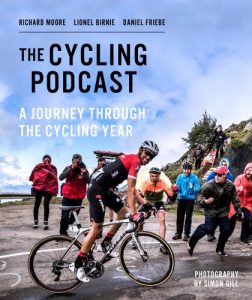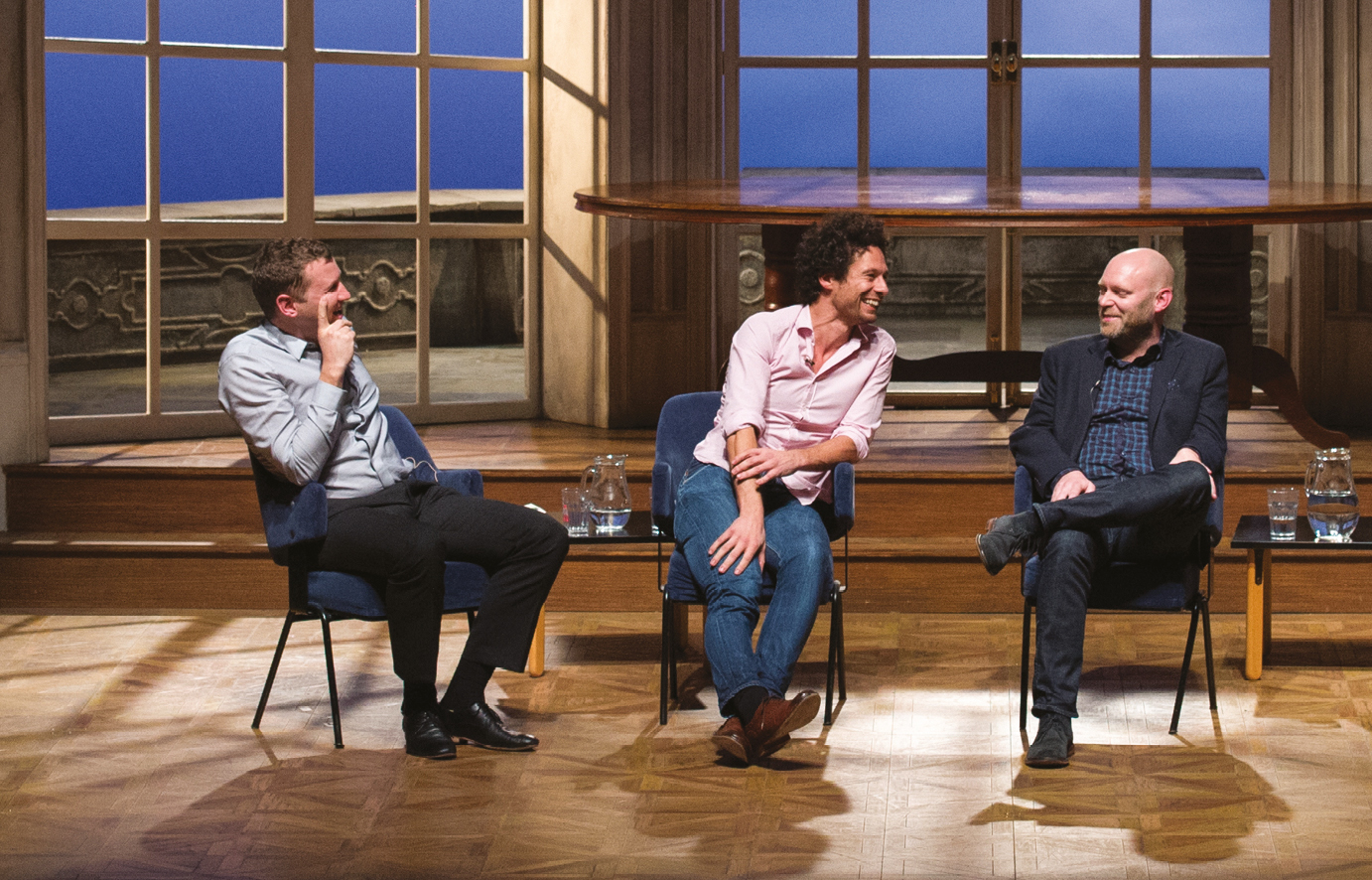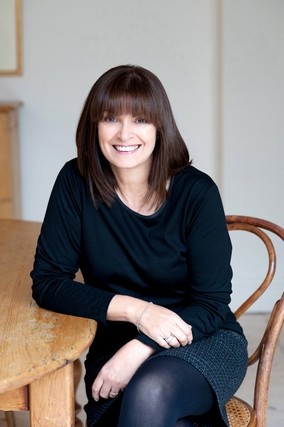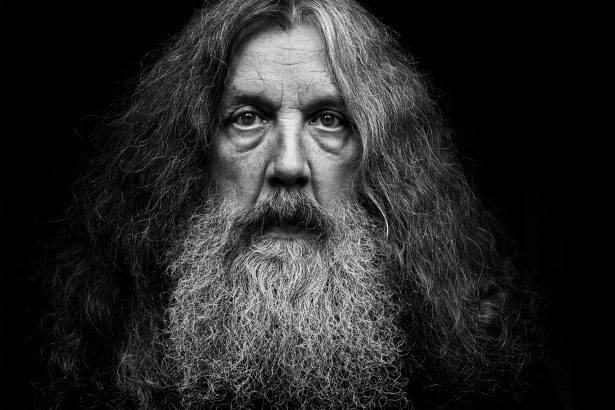 I can remember the first time I listened to The Cycling Podcast. It was 2014, there was a long car journey to fill, and the way cycling writers Lionel Birnie, Daniel Friebe and Richard Moore managed to mock-argue about whether the Ardennes Classics were actually in the Ardennes (or, indeed, classics), but still convey what made those professional road races interesting and important made for hugely enjoyable listening.
I can remember the first time I listened to The Cycling Podcast. It was 2014, there was a long car journey to fill, and the way cycling writers Lionel Birnie, Daniel Friebe and Richard Moore managed to mock-argue about whether the Ardennes Classics were actually in the Ardennes (or, indeed, classics), but still convey what made those professional road races interesting and important made for hugely enjoyable listening.
Much like Mark Kermode and Simon Mayo’s film podcast, the combination of entertainment and knowledge, humour and impressive detail meant that it felt inclusive; racers, club riders, people who religiously watch every race on Eurosport and people whose fix is perhaps only a Grand Tour highlights package could all enjoy this. There were catchphrases, in jokes and much-loved walk-on characters. It was – and still is – great fun.
Later that summer I shared another long car journey with a fellow cycling fan and I was surprised at the depth of our conversation about the season so far. I’d never met anyone who had so many interesting things to say about The Critérium du Dauphiné. And then it clicked. “Hang on… you don’t listen to The Cycling Podcast, do you?” He smiled knowingly. “Of course I do,” he replied.
I must have listened to every episode since, and watched as the trio have made ambitious plans to cover the grand tours daily, gone into (subscription-only) documentary podcasting, and signed sponsorship and advertising deals. The latter development is fine – transporting three people around the globe to cover cycling for a well produced and edited free podcast has to be paid for somehow. I can cope with regular messages for Science In Sport’s energy gels if it means I continue to get such fantastic insight into the world of professional cycling.
But a book of a cycling podcast? It works, but with qualification. The basic idea makes sense; to diarise a professional cycling year from the point of view of journalists who tend to cover it with their voices (although all three are of course accomplished writers). There is more room here to expand on the experience of the grand tours, from the food and wine (bad and good) to the hotels – Birnie’s description of a Spanish guest house straight out of a horror movie, complete with bats, is laugh out loud funny – and sometimes the racing itself.
The idea is to emphasise how covering professional cycling can be as absurd as it is serious, and that the podcast is about capturing the journey as well as the ups and downs of the actual race. And they do that very well, even if the diary format and familiar tone means the subject matters tend to blur into one other. It’s effectively a travelogue that will entertain the podcast’s listeners as well as refresh their memories – but that’s just about the sum of its parts. Admittedly, at no point do they ever promise that this book will be as insightful into an aspect of professional cycling as, say, Edward Pickering’s forthcoming book on the Tour Of Flanders, The Ronde. But it does feel just a little like a stocking filler for the cycling (podcast) fan in your life.
In fact, the most interesting contributions are from The Cycling Podcast’s regular collaborators and contributors. South African rider Ashleigh Moolman Pasio’s thoughts on the Giro Rosa are are eye-opening and thought-provoking – as are Joe Dombrowski’s views on the future of the men’s sport, written while his team Cannondale-Drapac was collapsing and then being saved as (deep breath) Team EF Education First-Drapac powered by Cannondale.
Francois Thomazeau, too is a deep thinker on professional cycling, when he’s not calling out the sport’s ‘boolsheeet’, and it’s fascinating to read his thoughts on why there has been no French winner of Le Tour since Bernard Hinault. “While the French have not won The Tour since 1985, the Dutch have not done so since 1980 and the Belgians since 1976”. I’d never thought of it like that. Elsewhere, Fran Reyes posits some really interesting ideas about why Alberto Contador became a hero for Spaniards after his doping ban, rather than a villain.
The book opens and closes with a transcription of Birnie, Friebe and Moore’s conversations at the beginning and end of the season, as if they were podcasting. It’s a gamble to present it like this, but worth it alone for their thoughts on what podcasting can offer. Birnie explains why it feels like a freer form of media than writing, less constraining, more immediate. Moore enjoys the relationship and connection with listeners and says the contradictions of professional cycling can be balanced far more easily in a podcast than the written word, with its deadlines and strict word counts. And Friebe argues that: “All the things that make cycling unique… The place, the sounds, the flavours – all things we’re able to articulate with the podcast,” he says.
Which makes a book about it slightly unintuitive. To be completely fair to Moore, Birnie and Friebe, I think they realise this – on the second page Birnie jokingly calls their book the anti podcast. But while the podcast’s great strength is that it is for all comers, it does feel slightly that the book of the podcast is happier to trade on its fanbase alone. Nothing terribly wrong in that, and with Simon Gill’s excellent captioned photography it’s a package that every listener will enjoy. But just like a podcast is quickly deleted after it is listened to, so the book is ephemeral rather than essential.
The Cycling Podcast (Yellow Jersey Press) is out now.
[amazon asin=978-1787290266&template=add to cart]

